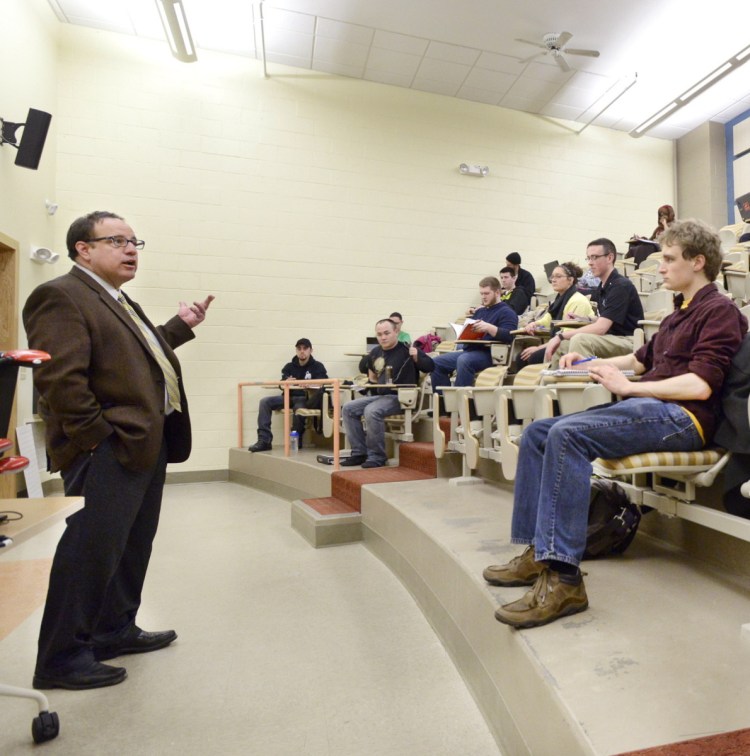There has been a lot written recently about the value of a college education, and as a university president, I occasionally get asked if college should be for everyone.
My answer is an emphatic “yes.”
If you want to go to college, you’re willing to work hard and you have been sufficiently prepared through high school, military service or your employment, then college is a viable and smart option.
It’s OK, of course, to rule out higher education if you have an alternate path to success or certain long-term employment that pays a livable wage. Those are fine reasons to forgo college. But here are four bad reasons to rule it out:
• Bad reason No. 1: You think you can’t afford it. Too many people are under the mistaken impression that a college education costs tens of thousands of dollars a year. Sure, that may be the case at a lot of exclusive schools, but even there, one should not get too caught up in the sticker price. Those schools often discount their prices significantly based on merit or need.
Moreover, tuition at public universities is significantly less. Coupled with financial aid – which over 85 percent of students at my own university receive – the costs can be brought down to a very affordable price.
• Bad reason No. 2: You don’t think you’re college material. I can assure you that you probably are, regardless what you or others may think. Teachers told Thomas Edison he was too “addled” to learn anything. Albert Einstein’s parents feared that a report that he was “subnormal” might be true. At an early age, Beethoven was told that he was hopeless as a composer.
Every day, I run into students who had been told throughout their lives they were not college material, but today are thriving in college. They just needed a chance and a willingness to work hard.
• Bad reason No. 3: You feel you are too old. While someone in their 30s, 40s or 50s might stick out at some universities and colleges, there are many institutions where adults are the norm. At the University of Southern Maine, for example, we take pride in the fact that a large percentage of our students are above the typical college age.
• Bad reason No. 4: You already have a good job. That’s great, but will that job still be there when the economy turns sour? During the last recession, the unemployment rate for people with less than a high school education was more than 15 percent, with just a high school education 10 percent, and with an associate degree, 8 percent. With a bachelor’s degree, however, the unemployment rate was less than 5 percent.
So those are four bad reasons to rule out college. Here are four good reasons to rule it in.
• Good reason No. 1: A college education improves your lifetime earnings dramatically. While college-educated workers’ wages have increased over the past two decades, annual salaries for those with only a high school education have decreased. Over the course of one’s lifetime, the Federal Reserve Board of San Francisco estimates, a college graduate will earn $830,000 more than someone without a college degree.
• Good reason No. 2: Inoculate yourself against the next recession. We encourage adult workers to earn a college degree while they are employed and times are good. Many employers offer tuition support, which is a significant benefit that employees should take advantage of. And when your employer invests in you, they are more likely to retain you when cuts are being considered.
• Good reason No. 3: Entire job sectors for people without college degrees are going away. Mainers know all too well of the disappearance of good jobs in the paper mills. Now, other industries like transportation are starting to follow suit. Despite the recent tragedy involving a driverless car killing a pedestrian, such cars and trucks are well on their way to replacing workers behind the wheel.
• Good reason No. 4: There is a huge workforce demand for people with a college degree. The demand for employees with bachelor’s degrees is substantially increasing. Right now, there are close to 2,000 job openings just in Maine that are sitting vacant, because they require applicants with a bachelor’s degree.
So, is college for everyone? It definitely should be for everyone who is looking for security for themselves and their families.
It is up to colleges and universities to provide the opportunity. That’s why public universities are especially important. While some schools pride themselves on whom they reject, we pride ourselves on whom we accept. By combining accessibility and affordability with academic excellence and a focus on the workforce needs of our region and state, everyone benefits.
In the end, the question isn’t whether college is for everyone. It’s what are you waiting for?
Send questions/comments to the editors.



Success. Please wait for the page to reload. If the page does not reload within 5 seconds, please refresh the page.
Enter your email and password to access comments.
Hi, to comment on stories you must . This profile is in addition to your subscription and website login.
Already have a commenting profile? .
Invalid username/password.
Please check your email to confirm and complete your registration.
Only subscribers are eligible to post comments. Please subscribe or login first for digital access. Here’s why.
Use the form below to reset your password. When you've submitted your account email, we will send an email with a reset code.